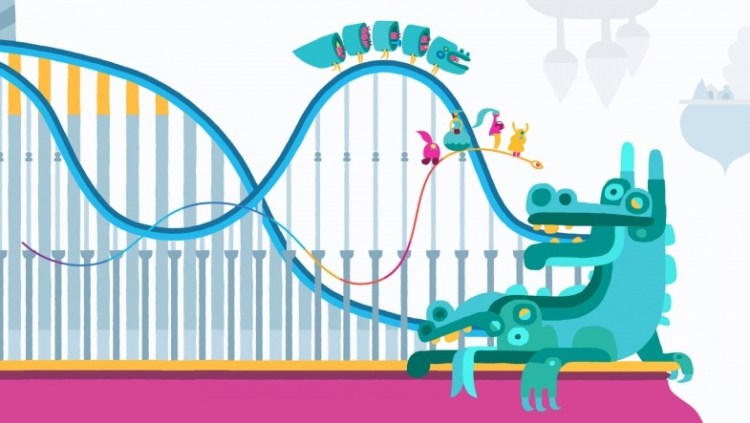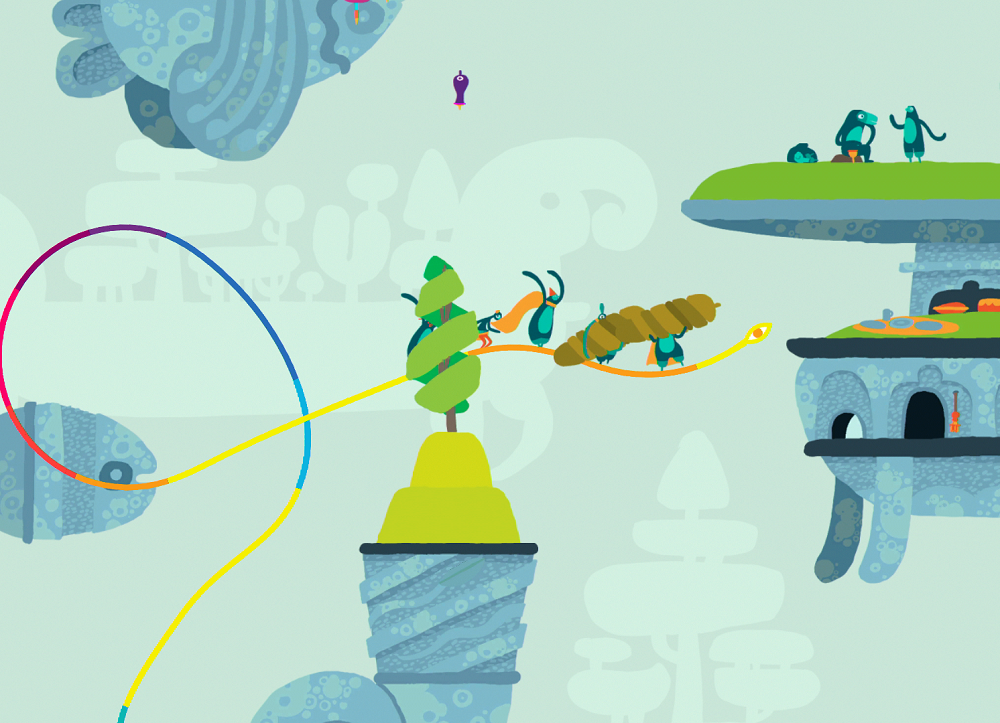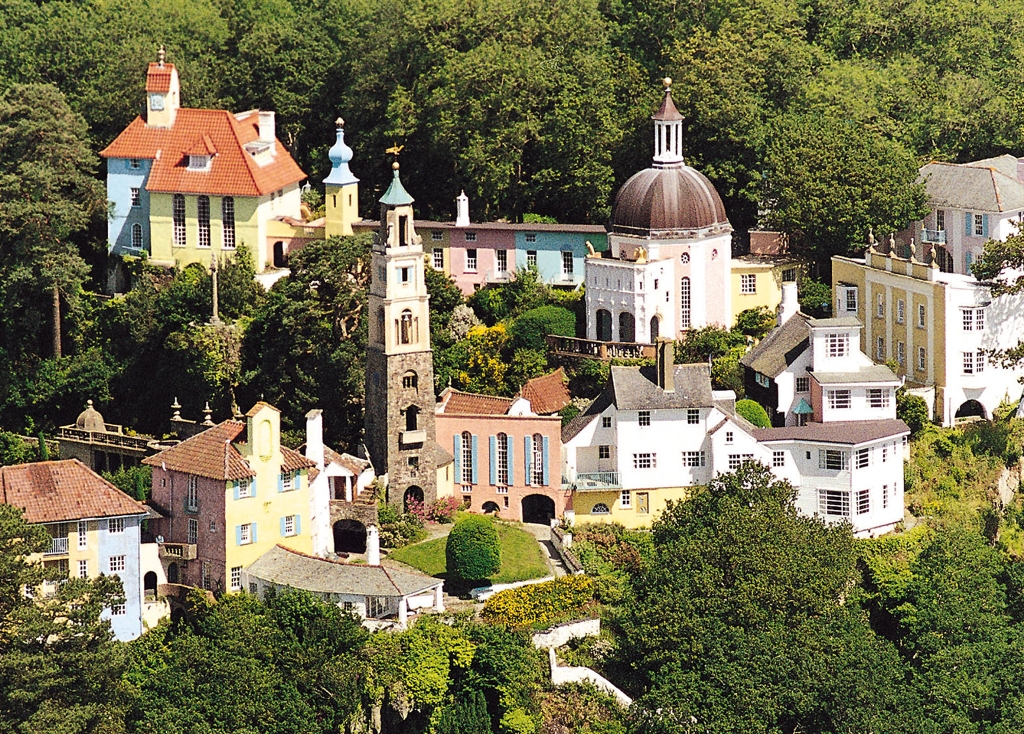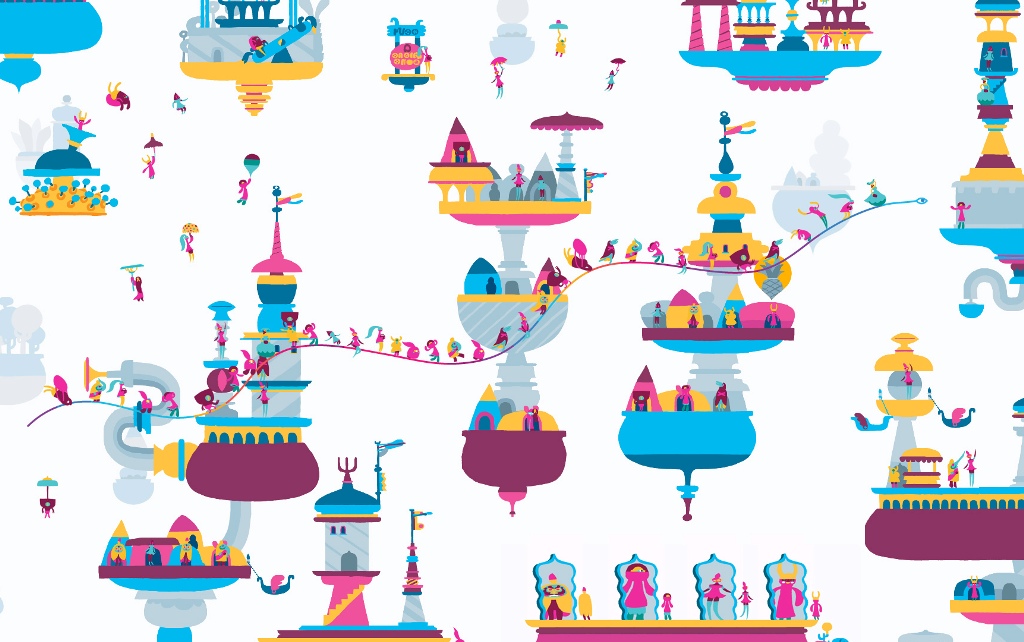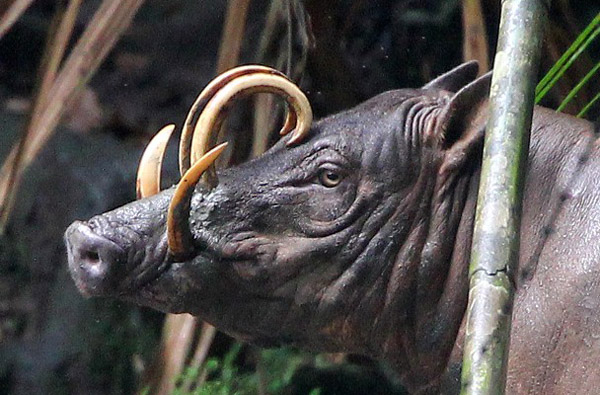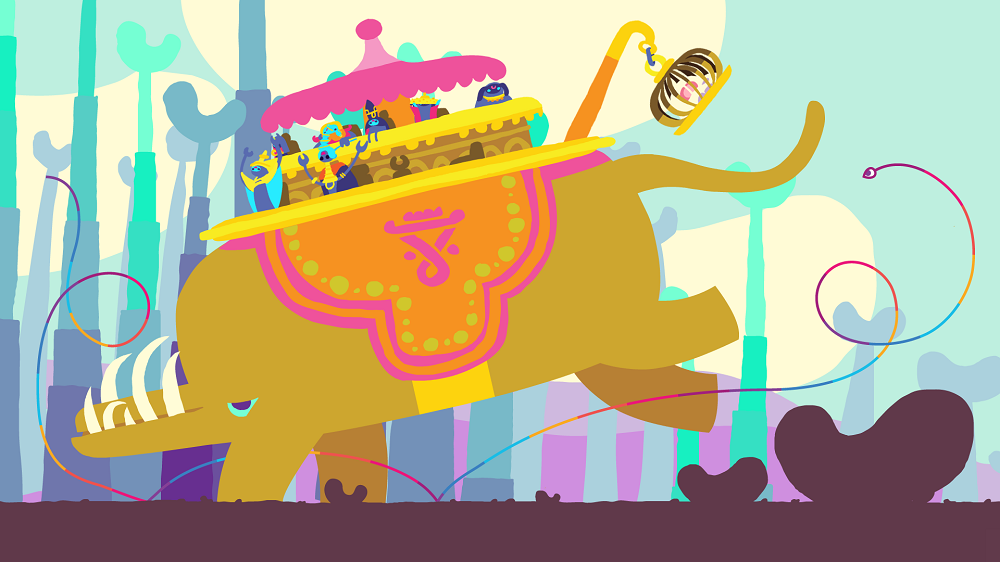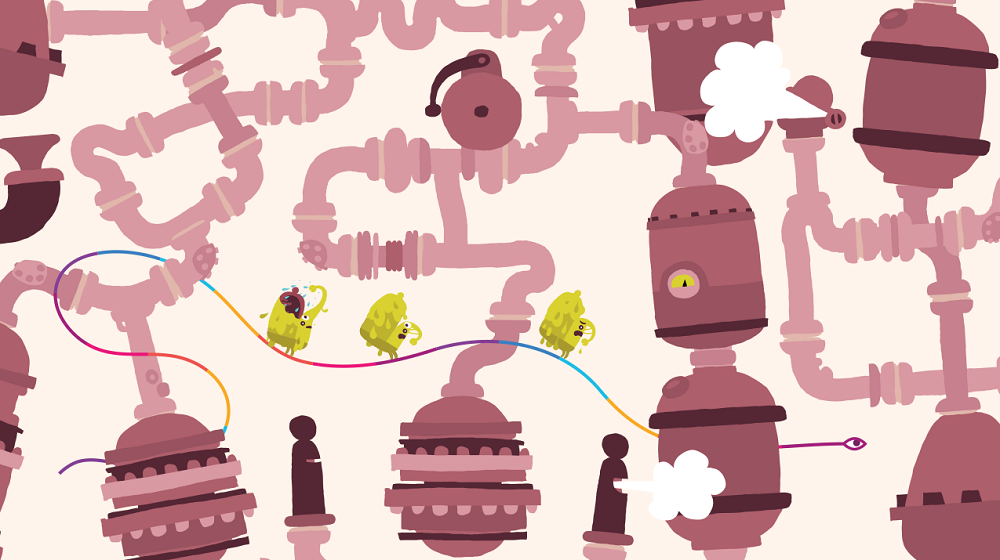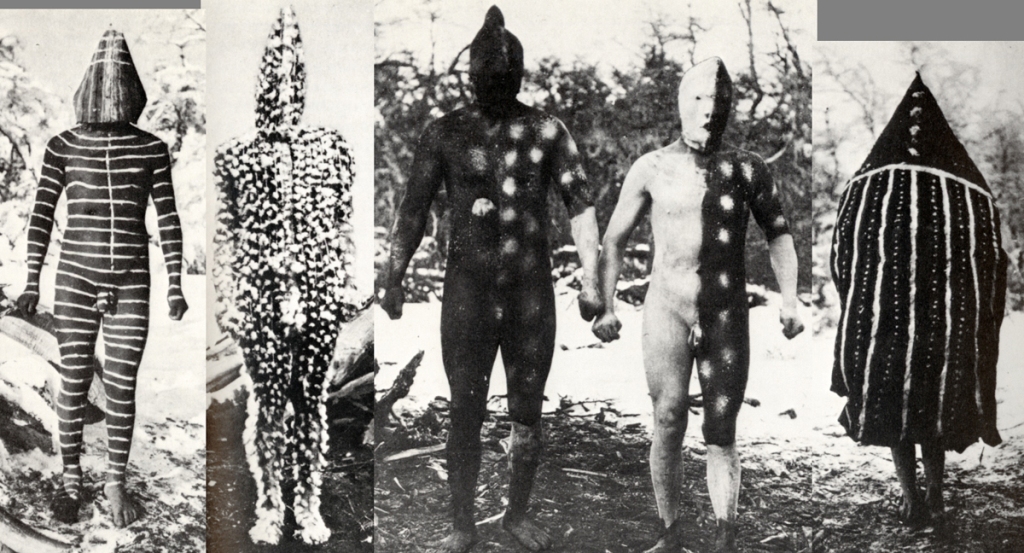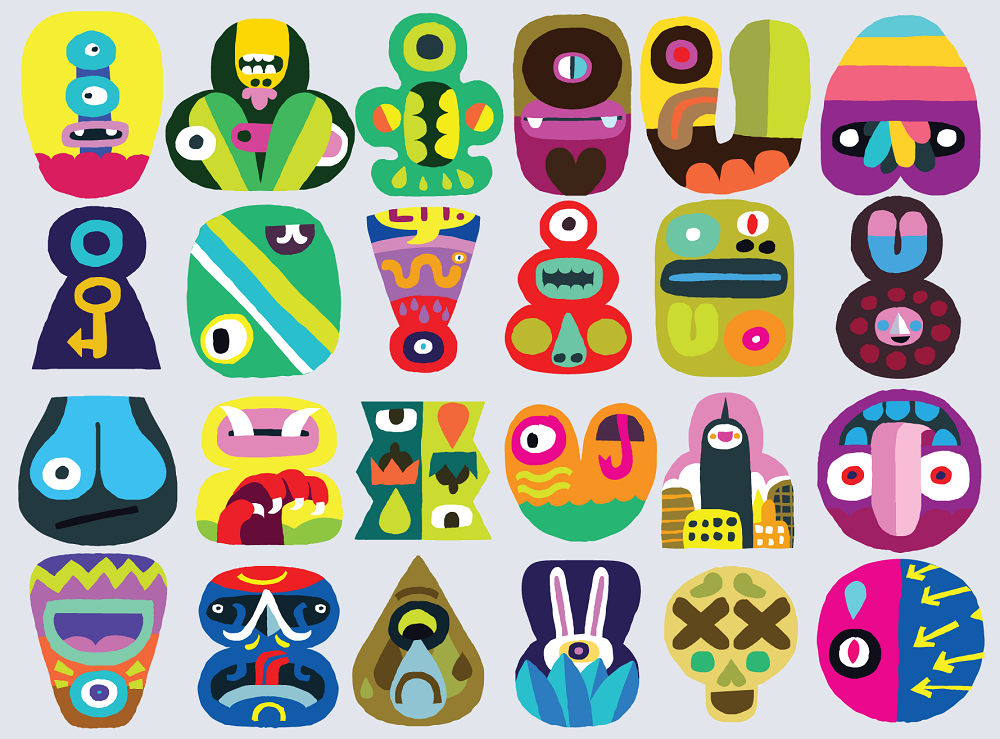Hohokum is a … well, um … I’m not 100 percent sure what it is. I can tell you it’s a downloadable game for the PlayStation 4, PS3, and Vita. It comes out Aug. 12. And it’s colorful, whimsical, and just plain weird. When I assigned our upcoming review of Hohokum to GamesBeat writer Evan Killham, he said, “Should be interesting. I watched the trailer and still don’t know what the hell it is.”
The quick and no-justice way to describe Hohokum to gamers: It’s similar to the video game Flower, where you just fly around (as a snake-like kite thingie) and interesting things happen. (Flower’s also a bit hard to explain succinctly, right?) You can watch the trailer below for a better visual, but we’re not here to give you a preview or spoil Evan’s review. (UPDATE: Here it is.) We’re here to see what got into the minds of the developers.
We chatted with Ricky Haggett, the designer and cofounder of development studio Honeyslug, and Richard Hogg, Hohokum’s artist and collaborator, to see what influenced and inspired this quirky, one-of-a-kind game. The first five things to come to their minds were …
… kites
Richard Hogg: We love kites. I guess kites are a fundamental inspiration for Hohokum, because when we talk about the thing that you are in the game — the way you move and the way the player might feel when controlling it — kites are always the first analogy we go for.
It wasn’t like we sat around saying, “Hey, we like kites. Why don’t we make a thing that’s a bit like a kite?” It was more that when we first started prototyping that thing, all of us said, “It feels a bit like you’re flying a kite.”
That became a very useful benchmark feeling for what you are in the game and how you feel in the game. Both in terms of literally the way it moves but also in that it’s kind of a creative thing. It’s not like that line in the sky that you’re drawing is ever going to be a permanent thing. It’s a thing that lasts a few seconds. It’s kind of creative but in a throwaway sort of way, I suppose.
Ricky Haggett: Speaking of kites, there is a real Hohokum kite now. We have a chap in England called Karl Longbottom who made this.
Hogg: He’s a kite designer. I’ve still not seen the kite in real life, though. I’m quite excited about getting my hands on it. But apparently you need to be a professional kite-flyer. Or at least somebody who’s an experienced kite-flyer. It’s quite big.
Shall we move on to the next thing?
… the village of Portmeirion in North Wales
Hogg: You might be familiar with this place from a ’60s TV series called The Prisoner. Portmeirion is the town where all the filming was done for it.
It’s a strange — it’s almost like a sort of village-sized folly. This guy called Clough Williams-Ellis owned the land. He’d been to places around Lake Como [Italy] and Palladian mansions and that kind of thing. He decided to make some version of it as a strange hobby, an architectural project. He built this quaint, strange village with Italianesque houses. They’re all … very unusual choices of colors. Not quite pastel-y but quite strong. Quite Hohokum-ey colors, I suppose. It’s an amazing place.
From a distance it looks like quite a substantial little town built into the hillside on a bay. When you actually go there, you realize the buildings are kind of half-size. The things that from a distance look like mansions are actually just little cottages. It almost has a kind of film set or theme park feel to it. But at the same time it’s quite old.
Ricky, have you ever been there?
Haggett: No. I’ve only seen pictures.
Hogg: You should go there. It’s a long way to go, but if you’re in that part of the world, it’s worth going. Although it’s kind of spoiled by tourists. You shouldn’t go there in the summer. It’s busloads of idiots just hanging around there. It’s a good place to go in the winter. It’s a good place to go for a little romantic getaway. The restaurant there is quite good.
Sorry, I’m rambling.
… the babirusa
Haggett: There’s a bit in the game where there’s this huge creature that lumbers around on a kind of plateau. There’s a bunch of characters that ride on his back. I guess the feeling of it is a bit like when, in the days of the British Raj, people would go to India and have a ride on an elephant.
Hogg: You can Google it, and you won’t believe this thing actually exists. It doesn’t seem believable.
Haggett: It’s a weird deer-like pig. It looks like a hairless wild boar, and its tusks are growing too long. It almost looks like its tusks are going to grow back and stab it in the eye. I like the fact that it — like a lot of things in Hohokum — is kind of familiar, but there’s something different about it that makes it not of this world.
Haggett: Yeah. All of us in the programming team just called it an elephant. We’d always call it an elephant. The more annoyed Richard got, the more we enjoyed doing that.
Hogg: It’s not an elephant, guys. It’s a giant babirusa.
Haggett: Have you ever seen one of these in real life?
Hogg: Yeah, I think I have. I think they’ve got one at London Zoo. Or am I getting it mixed up with the warthogs?
On a wider note, we are often inspired by things like this, real things that are just on the edge of consciousness. They’re not famous. They’re not things everyone is familiar with. When you search “babirusa,” the next thing Google recommends to you is the pink fairy armadillo. Which is another one of these stupid creatures that’s really weird, almost unbelievably strange-looking, but it’s a real thing that exists. We haven’t got one of those in the game, unfortunately.
Haggett: Save it for the next game.
Hogg: Yeah. The next game will be full of pink fairy armadillos.
… guano factories
Haggett: Part of the process of making Hohokum has been a sense of trying to make it feel well-rounded. Even though its world is crazy, and a lot of the stuff in it is surreal and strange, it’s nice to have a game that has a logic to it, that mirrors the logic of our world. In our world, we produce stuff, and we produce that stuff in factories. It makes sense that in Hohokum there are factories and farms and all kinds of different things like that.
My parents have lived in the Middle East for quite a long time. One of my overriding memories is going to [see them] when they were living in Bahrain, which is a little island in the Persian Gulf. It’s run out of oil now, but it still has tons of natural gas.
Almost all of it is desert, and almost all of the desert is crisscrossed by miles and miles of rusty pipes — these weird little rusty tanks and funny little machines that you have no idea what they are. Everywhere you go, you’re always seeing these pipes. Sometimes off in the distance and sometimes right up alongside the road. Presumably most of them are in use. It seems like they’re still doing stuff. When you look at a guano factory, it has a similar feel to it: a mess of pipes that go all over the place.
Hogg: Pipes. That’s my only contribution to that bit, the word “pipes.” I enjoyed drawing those pipes.
… Selk’nam people
(Warning: A slightly NSFW image is at the bottom of this section.)
Hogg: The last one is the Selk’nam people of southern Argentina. They are a tribal people from the very bottom of South America, the very tip. They don’t exist anymore, because they were wiped out in a genocide, unfortunately. But they’re amazing. I don’t really want to talk about the bit of the game that’s partly inspired by these people, because it’s a bit that we want to be a surprise to players.
If you go and look at pictures of what these people looked like, what they dressed up like, they’re pretty awesome. Their whole way of life was amazing.
Their whole religion, their traditions, was focused around a thing called a Hain. It’s like a religious festival where the gods would appear and perform various dances and things. As far as anyone was concerned, you were looking at the gods. They weren’t people dressed up as the gods; they were the gods.
They were pretty scary as well. As far as anyone can tell, all of the women in this society and all the people below a certain age really believed that those strange-looking figures that appeared during the Hain were the gods, much in the same way that kids of a certain age really believe in Santa.
But the gods are just a selection of the men of the tribe dressed up, and all of the men in this society know that. When they reach a certain age, they are initiated into the secret. It’s a closely guarded secret, that all of these deities —
Haggett: The initiation ceremony is basically these young teenage boys being taken away by the gods, completely terrified of what’s going to happen, and then the men are like, “Hey, guys, it’s us! Don’t worry!”
Hogg: It’s just your uncle.
Haggett: “This is all nonsense! Don’t tell any of the women.”
Hogg: It’s all a bit dodgy. But the interesting thing for me is that they didn’t have any other religion. Their entire religion is a kind of phony one, where half the population doesn’t really believe it. It’s really unusual. Most people living in tribal settings believe their religion so strongly, to a point where they’ll do quite nasty things in the name of their religion. Whereas this tribe of people, the Selk’nam, as far as anyone can tell, it was all a big joke.
But they got wiped out by people who were there to build farms and things in that part of the world. It’s really sad. But yeah, the costumes are incredible. They’re some of the best, weirdest tribal costumes you’ll ever see.
It’s nice to do an interview like this and have an opportunity to talk about it in a more explicit way. Hopefully, if anyone is interested, they can find out about some of the stuff that’s knocking around our heads while making this game, and they can look for examples.
VentureBeat's mission is to be a digital town square for technical decision-makers to gain knowledge about transformative enterprise technology and transact. Learn More
